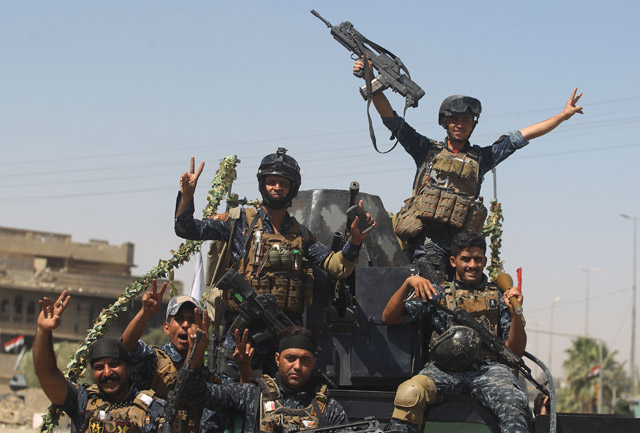MOSUL, Iraq — Iraq declared the Daesh terror group’s “caliphate” was coming to an end after it recaptured Mosul’s iconic Nuri Mosque Thursday, three years to the day after it was proclaimed by the extremists.
The extremist group announced its self-styled “caliphate” on June 29, 2014 across swathes of territory its fighters overran in Iraq and neighbouring Syria.
Its rule since then has been marked by repeated atrocities including mass beheadings and other executions documented in photos and videos that its supporters share online.
“Counter-Terrorism Service forces control the Nuri Mosque and Al Hadba [minaret],” Iraq’s Joint Operations Command said in a statement.
Staff Lieutenant General Abdulghani Al Assadi, a senior CTS officer, also confirmed its recapture, telling state TV that “the mosque is [now] behind our units”.
Iraqi Prime Minister Haider Al Abadi hailed the recapture of the mosque as a sign of Daesh’s impending defeat.
“We are seeing the end of the fake Daesh state,” Abadi said in an English statement on his Twitter account.
The mosque and its famed Al Hadba (hunchback) leaning minaret were Mosul landmarks and also held major significance in the history of Daesh rule in Iraq.
Daesh declared its “caliphate” in an audio recording three years ago.
A video released a few days later showed Daesh chief Abu Bakr Al Baghdadi speaking at Friday prayers at the Nuri Mosque and calling on Muslims to obey him, his only known public appearance as “caliph”.
Baghdadi’s fate and whereabouts remain unknown, and Daesh has lost much of the territory it overran in 2014.
The extremists blew up the mosque and minaret on June 21 as they put up increasingly desperate resistance to the advance of Iraqi forces.
Only the base of the minaret remains, and while the mosque’s dome is still standing, much of the rest of it has been destroyed.
Officials from Iraq and the US-led anti-Daesh coalition said the destruction of the site was a sign of the extremist group’s imminent loss of Mosul, with Abadi calling it an “official declaration of defeat”.
Heritage destroyed
The loss of the iconic 12th century minaret — one of the country’s most recognisable monuments sometimes referred to as Iraq’s Tower of Pisa — left the country in shock.
But the destruction had been widely anticipated, with commanders saying Daesh would not have allowed Iraqi forces to score a hugely symbolic victory by recapturing the site.
Daesh claimed on its Amaq propaganda agency that the site was hit in a US air strike, but the US-led coalition said it was the extremists who had “destroyed one of Mosul and Iraq’s great treasures”.
Russia has said it is seeking to verify whether the Daesh leader, whose whereabouts have been unknown for months, was killed when its warplanes hit the group’s leaders in a night air raid in Syria last month.
The mosque in Mosul’s Old City was the latest in a long list of priceless heritage and historical monuments destroyed by Daesh during its three-year rule over swathes of Iraq and Syria.
The minaret, which was completed in 1172 and had been listing for centuries, is featured on Iraq’s 10,000-dinar banknote and was the main symbol of Iraq’s second city — giving its name to countless restaurants, companies and even sports clubs in Mosul.
After seizing Iraq’s Sunni Arab heartland in June 2014, Daesh reportedly rigged Al Hadba with explosives but was prevented from blowing it up by the local population. The extremists consider the reverence of objects, including of such sites, as heresy.
The mosque’s destruction came three days after government forces launched an assault on the Old City, the last district of Mosul still under Daesh control.
Tens of thousands of residents are believed to still be trapped in the district by Daesh, which has been using civilians as human shields to defend its last redoubt in Mosul.
The area still controlled by the extremists is small but its narrow streets and the presence of so many civilians has made the operation perilous.
Dozens of civilians were brought out of the area of the Nuri Mosque in military vehicles on Thursday.
“We don’t believe that we made it alive,” said Umm Karam, one of those who fled.
